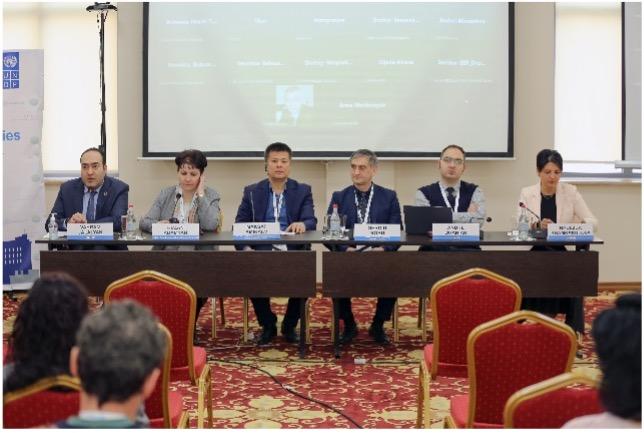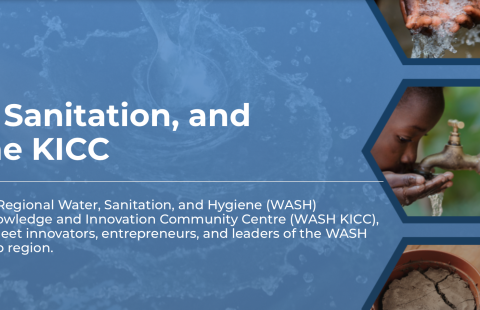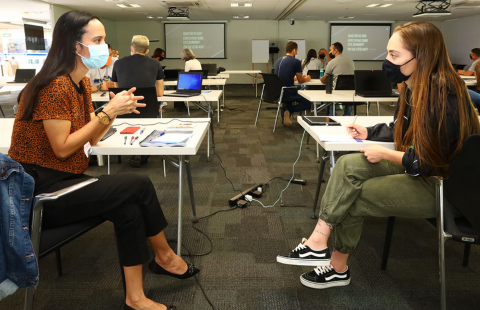
Attended by 60 participants from Albania, Armenia, Belarus, Bosnia and Herzegovina, Georgia, Kyrgyzstan, North Macedonia, Republic of Moldova, Germany, and Russian Federation, the event served as a platform for pilot countries and other UNECE member States for exchange of experience and sharing best ways to support MSMEs working in the area of energy efficiency and renewable energy in the current economic and social conditions.
The workshop “Outcomes of the project “Global Initiative towards post-Covid-19 resurgence of the MSME sector: Guidelines and Best Practices for MSMEs in delivering energy efficient products and in providing renewable energy equipment” was organized by UNECE and held in Yerevan, Armenia and online on 11 March 2022.
The updated Guidelines and Best Practices for MSMEs in delivering energy efficient products and in providing renewable energy equipment were discussed. The event held a panel discussion and exchange of experiences on measures to support MSMEs working in the area of energy efficiency and renewable energy on implementation of recommendations in the current economic climate. The panel focused on discussing type of assistance that MSMEs working in the area of energy efficiency and renewable energy need, ways for MSMEs to overcome the challenges after the Covid-19 pandemic, as well as ways for Governments to help these MSMEs in recovering after the Covid-19 pandemic. Nationally customized Guidelines and Best Practices for MSMEs served as a basis for this discussion.
Georgia is taking efforts to develop harmonized legislation and is working on implementing legislation embracing all necessary characteristics, including energy packages. Various training programmes are also being prepared, including trainings for installation of PV systems and biomass boilers and trainings for and accreditation of energy auditors. To overcome barriers and challenges of the Covid-19 pandemic, the Government presented anti-crisis plan in 2020. The main idea was to initiate social studies for citizens, businesses, utility companies and provide targeted social assistance where needed.
The Government of Armenia has implemented a number of activities, specifically on providing support for the cost of procurement of new equipment; reducing the impact of economic activity on the environment; raising awareness among business representatives on the use of energy in more efficient manner and use of renewable energy. A number of measures dedicated to the support of start-ups and MSMEs were introduced during the Covind-19 crisis. They included trainings and effective use of resources to minimize the impact on the environment.
The Government of Albania was much involved in communication with the companies during the health crisis. Measures taken by the Government included payment support and postponement of financial obligations (including Bank of Albania and financial institutions) to support companies.
The Government of Albania supported MSMEs and their workers. Around 200,000 MSME workers received support as well as products to improve energy efficiency, such as windows, boilers, etc. Important work was done to explain to MSMEs how big the market is to reach energy efficiency targets in Albania. The Government also undertook measures to keep energy prices stable for MSMEs and households. At the same time, it is crucial to secure grant financing to support MSMEs, for example, through EBRD and GEF.
Most of MSMEs in North Macedonia were affected by the Covid-19 pandemic. Companies needed support through various measures, including access to loans. The Government responded to the demand of the MSMEs. The survey analysis of MSMEs showed that long-term change is needed. MSMEs need to implement measures, such as creation of partnerships, increased visibility and adaption of strategy accordingly. The current energy crisis and the increased energy prices also affect MSMEs. Therefore, additional tailored programmes by the Government are needed to support MSMEs.
The beginning of the Covid-19 pandemic coincided with the drought in the Republic of Moldova, which heavily affected the economy. The Government support during the crisis included a programme for remittances, a programme for growth and internalization, a greening MSMEs programme, the SME guarantee fund, a programme for digitalization of MSMEs, and a 100 million programme for women in business (especially for women leading MSMEs). The Government approved a law to support economy in overcoming the Covid-19 crisis. It included provisions aimed at suspension of audit of financial statements of MSMEs, postponing inspections of MSMEs, VAT reduction to 15 per cent for the hotel and restaurant sector. Further recommended actions to support MSMEs include increasing the value of innovation funds, using preferential loans for energy efficiency, creating partnerships and stable supply chains, engaging in export promotion, helping MSMEs to access external markets, and investing in energy efficiency and renewable energy.
Overall, awareness of the existence of support schemes for MSMEs is important and needs to be ensured before introducing additional schemes. Most of the Governments were fast to react to the changing situation and the health crisis. At the same time, the longer-term strategies are required to reduce the effects of the Covid-19 pandemic and create more sustainable policies, including for the operations of MSMEs.


